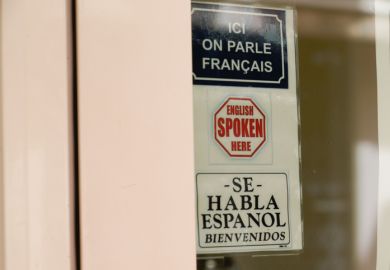The decline in the study of modern languages in the UK is more complex than headline applications data suggest, with some institutions and types of courses much less affected than others, according to a report.
For the study, commissioned jointly by the British Academy and the University Council of Modern Languages (UCML), course data from the admissions body Ucas were analysed to discern trends in course provision, applications and acceptances.
As well as the main Ucas categories for language courses – which show a stark decline in student numbers in the past 10 years − the data also included information on courses in other subject categories with a title related to modern language provision.
Although the data still indicated overall that there had been a “gradual decline” in language study from 2012 to 2018 – with a fall in course provision of 12 per cent and a drop in filled course places of 13 per cent – the picture was more mixed when looking at types of courses or institution.
For instance, in terms of institutions, the downward trend was most marked in some less selective universities: acceptances to study modern languages in the Russell Group of universities fell by 9 per cent over the period, in contrast to a decline of 28 per cent in other pre-92 institutions.
For types of courses, applications for single honours languages degrees fell by 30 per cent across the period, according to the data, and acceptances dropped by almost the same level. But degrees where a language was being taken in combination with a social science remained steady, and joint programmes that involved other humanities subjects grew slightly.
There was also evidence of modest growth in the study of applied languages or translation, the report adds, and “a shift in course titles away from specific single languages to more general names”.
“While the number of courses on offer in fact fell, the number of them that were entitled ‘modern languages with translation’ or similar increased significantly, such that the proportion of courses so named grew from less than 20 per cent to almost half,” the report says.
The data also indicated a variation in changes to provision according to the specific language studied.
While acceptances to study French, German and Russian all shrank by about 30 per cent, those given a place on a Spanish and Portuguese course fell by less than 10 per cent, and the numbers studying Chinese rose by 5 per cent. Japanese and Korean − although from a low base − also recorded big increases.
“The trend, then, is not one of decline in all areas, but of a shift away from the more traditional languages, and (in aggregate) from European to non-European. By the end of the period, as many students were being accepted to read Korean as Russian, and more were studying Japanese or Chinese than Italian,” the report says.
“We recommend that language departments re-examine their course offerings with a view to both expanding the range of courses in combination with other HSS [humanities and social sciences] subjects, in line with local strengths, and also the provision of tuition in a greater range of non-European languages,” the report concludes.
Following the report, the British Academy and the UCML confirmed that they are to launch a new “strategic committee” for languages, something proposed in a policy paper last year, to more closely monitor trends.
Neil Kenny, languages lead at the British Academy, said: “While noting that the overall trend is of continued decline, the British Academy welcomes this report’s identification of slight growth for modern languages in certain areas such as joint honours provision, and agrees that the role of monitoring language trends should be coordinated at a national level.
“We are also closely monitoring factors affecting language learning in secondary education, as this forms a vital pipeline of talented linguists into university and beyond.”
Register to continue
Why register?
- Registration is free and only takes a moment
- Once registered, you can read 3 articles a month
- Sign up for our newsletter
Subscribe
Or subscribe for unlimited access to:
- Unlimited access to news, views, insights & reviews
- Digital editions
- Digital access to THE’s university and college rankings analysis
Already registered or a current subscriber?






